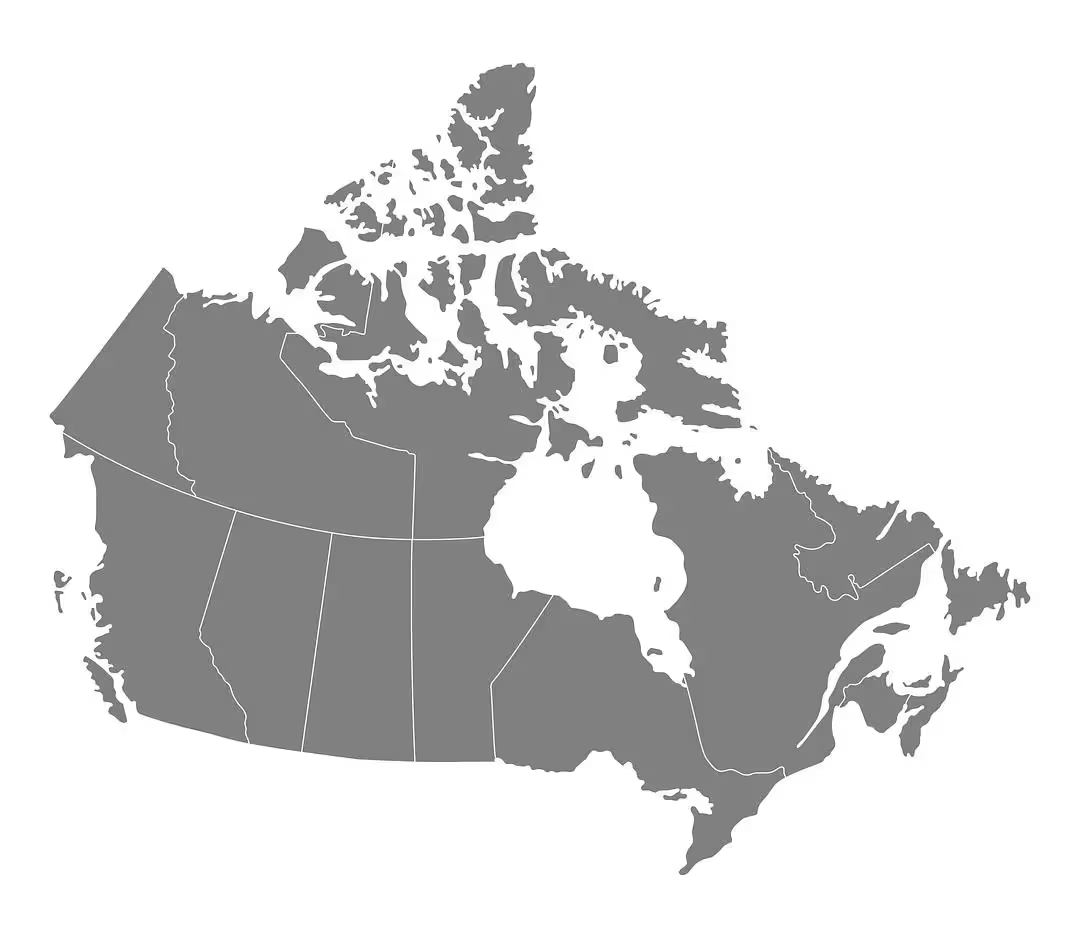British Columbia
$17.85


Navigating the hiring landscape in Canada can be complex, but with the right insights, you can streamline your process. Discover how to compliantly hire top talent and manage your workforce effectively across provinces while unlocking access to one of North America's most skilled talent pools.
Capital City
Currency
Languages
Population size
Services available in this country:

Canada's robust economy offers access to diverse talent across major hubs like Toronto, Montreal, and Vancouver, with strong demand for tech, healthcare, and skilled trades professionals. Understanding the market fundamentals—from tax structures to economic indicators—helps you make informed decisions about expanding your team north of the border.
Successfully hiring in Canada requires navigating federal and provincial employment standards that vary significantly across the country. This comprehensive guide covers everything from minimum wage requirements and payroll obligations to leave entitlements and onboarding essentials, giving you the clarity needed to hire with confidence.
Canada operates a multi-tiered minimum wage system with federal standards applying to federally regulated industries and each province setting its own rates. The federal minimum wage is $17.75 CAD per hour as of April 1, 2025.
Most provinces adjust minimum wage rates annually based on the Consumer Price Index (CPI) to account for inflation.
Canadian employers typically follow one of three payroll schedules:
Provincial employment standards dictate minimum pay frequency requirements, with most requiring at least monthly payments.
Canada operates a progressive federal tax system combined with provincial taxes. Federal tax brackets for 2025:
Income Bracket (CAD)Federal Tax RateUp to $53,35915%$53,359.01 to $106,71720.5%$106,717.01 to $165,43026%$165,430.01 to $235,67529%Over $235,67533%
Provincial tax rates vary significantly, with combined federal-provincial rates ranging from approximately 20% to 53% depending on income level and province.
Individuals are considered Canadian tax residents if they:
Tax residents must pay Canadian income tax on worldwide income, while non-residents pay tax only on Canadian-source income.
Employers must contribute to several mandatory programs beyond gross salary. Contribution rates vary by province and industry:
These contributions fund public pensions, employment insurance, healthcare, and workplace safety programs.
Standard working hours in Canada are 8 hours per day and 40 hours per week. However, specific regulations vary by province:
Certain employee categories may be exempt from hour limits, including senior managers, IT professionals, and commissioned salespeople.
Overtime compensation is mandatory for non-exempt employees:
Full-time employees: Generally work 30+ hours per week and receive full benefits entitlements.
Part-time employees: Work fewer than 30 hours per week but retain most statutory protections on a pro-rated basis.
Contract vs. Permanent: Permanent employees receive full statutory protections, while fixed-term contracts may have modified notice requirements but cannot circumvent employment standards.
All employees are entitled to paid vacation time:
Sick leave provisions vary significantly across jurisdictions:
Federal employees: 10 days of paid sick leave annually (effective December 2022)
Provincial variations:
Medical certification may be required for extended absences, typically after 3-5 consecutive days.
Pregnant employees are entitled to job-protected maternity leave:
Parental leave is available to all new parents:
Standard option:
Extended option:
Bereavement leave:
Family responsibility leave:
Domestic violence leave: Available in most provinces (5-10 days, partially paid in some jurisdictions)
| Leave Type | Duration | Paid? | Funding Source |
|---|---|---|---|
| Vacation | 2-3 weeks/year | Yes | Employer |
| Sick Leave | Varies (2-10 days) | Partially | Employer/Government |
| Maternity | 17 weeks | Yes (55% EI) | Government |
| Parental | 40-69 weeks | Yes (33-55% EI) | Government |
| Bereavement | 2-10 days | Partially | Employer/Government |
| Family Emergency | 3-10 days | Partially | Employer/Government |
Termination with cause:
Termination without cause:
Minimum notice periods based on length of service (common provincial standard):
| Length of Employment | Minimum Notice Period |
|---|---|
| Less than 3 months | None |
| 3 months to 1 year | 1 week |
| 1 to 3 years | 2 weeks |
| 3 to 4 years | 3 weeks |
| 4 to 5 years | 4 weeks |
| 5 to 6 years | 5 weeks |
| 6 to 7 years | 6 weeks |
| 7 to 8 years | 7 weeks |
| 8+ years | 8 weeks (varies by province) |
Employers may provide working notice or pay in lieu of notice.
Severance is separate from notice and applies in specific circumstances:
Federal requirement:
Provincial variations: Some provinces don't mandate severance unless specified in employment contracts.
Employers must issue final pay within prescribed timeframes:
Final pay must include all earned wages, vacation pay, and other entitlements.
Employees cannot be terminated for:
Violations can result in wrongful dismissal claims, human rights complaints, and significant financial penalties.
Federal statutory holidays apply to federally regulated employees and serve as a baseline:
| Holiday | 2025 Date |
|---|---|
| New Year's Day | January 1 |
| Good Friday | April 18 |
| Victoria Day | May 19 |
| Canada Day | July 1 |
| Labour Day | September 1 |
| National Day for Truth and Reconciliation | September 30 |
| Thanksgiving Day | October 13 |
| Remembrance Day | November 11 |
| Christmas Day | December 25 |
Each province adds additional statutory holidays:
British Columbia: Family Day (February 17), BC Day (August 4) Ontario: Family Day (February 17), Civic Holiday (August 4) Quebec: St. Jean Baptiste Day (June 24), Patriots' Day (May 19) Alberta: Family Day (February 17), Heritage Day (August 4)
Some provinces recognize Boxing Day, Easter Monday, or other regional observances.
To qualify for statutory holiday pay, employees typically must:
Holiday pay calculation varies by province but generally equals average daily earnings.
Employees who work on statutory holidays receive:
Quebec: Unique holiday schedule includes Patriots' Day and St. Jean Baptiste Day Atlantic provinces: Some recognize additional maritime-specific holidays Territories: May have different holiday schedules reflecting local culture
Employment contracts must include:
Government forms:
Identity verification: Photo identification (driver's licence, passport) for employment eligibility.
All employees must be legally entitled to work in Canada:
Employers must verify work authorization but cannot discriminate based on citizenship status.
Background checks are permitted but must be:
Permitted checks:
Canadian privacy laws govern employee data collection and use:
Federal: Personal Information Protection and Electronic Documents Act (PIPEDA) Provincial: Various provincial privacy acts (Quebec's Law 25, BC's PIPA)
Key requirements:
Employment contracts must address:
Most employment contracts include probationary periods:
| Milestone | Timeline |
|---|---|
| Offer acceptance | Day 0 |
| Contract execution | Days 1-3 |
| Documentation collection | Days 3-5 |
| Government registration | Days 5-7 |
| Payroll setup | Days 7-10 |
| Benefits enrolment | Days 10-14 |
| Training commencement | Days 14-21 |
Understanding Work Classifications in Canada
Hiring in Canada means navigating one of the most worker-protective employment landscapes in the world. Whether you're a global company expanding into the Canadian market or a local startup scaling fast, it’s critical to understand how Canadian work classifications function, and how they impact compliance, taxes, and worker rights.
In Canada, how you classify a worker determines everything from payroll taxes and benefits to employment standards and liability. Misclassification, whether accidental or intentional, can lead to:
CRA audits and penalties
Retroactive payroll tax obligations
Breach of employment standards legislation
Legal claims for unpaid vacation, overtime, or severance
Understanding the difference between employees, independent contractors, and other worker types is foundational to compliant hiring.
Employees are hired under an employment agreement and covered by provincial or federal employment standards. This classification comes with a host of entitlements:
Statutory benefits (like vacation, sick leave, and public holidays)
Employer contributions to Employment Insurance (EI) and the Canada Pension Plan (CPP)
Severance obligations upon termination
Workplace protections like anti-harassment and minimum wage
Subtypes include:
Full-Time Employees: Typically work 30+ hours per week on a permanent basis.
Part-Time Employees: Work fewer hours but still receive proportional entitlements.
Fixed-Term Employees: Employed for a set duration or project; if extended repeatedly, they may be deemed permanent.
Best for: Long-term hires, roles with supervision or integrated into company operations, and when employers want control over how work is done.
Independent Contractors (or freelancers) are self-employed individuals who provide services to businesses under a service contract rather than an employment agreement.
Key characteristics:
Set their own hours and work autonomously
Provide their own tools and equipment
Take on financial risk or have the opportunity for profit
Work with multiple clients
Invoice for services instead of being paid a salary
Because they are not considered employees, contractors:
Do not receive employment benefits or protections
Must handle their own taxes and deductions
Are not covered by Employment Standards Acts
Best for: Specialized project work, flexible engagements, and when the business doesn’t need direct control over how the work is completed.
There’s no single test in Canada for determining a worker’s status—but courts and regulators typically use a multi-factor analysis, including:
Control: Who decides how, when, and where the work is done?
Ownership of Tools: Does the worker use their own tools?
Chance of Profit / Risk of Loss: Can the worker make or lose money based on how they perform?
Integration: Is the work central to the company’s core business?
Intent of the Parties: What does the contract say, and how does that compare to the reality?
If a contractor is working like an employee, they may be reclassified by the Canada Revenue Agency (CRA) or provincial regulators.
Canada also recognizes a third category in certain jurisdictions: the dependent contractor.
A dependent contractor:
Operates like an independent contractor
But earns most or all income from a single client
Has limited economic independence
In Ontario and British Columbia, for example, dependent contractors are entitled to reasonable notice of termination, just like employees. Misunderstanding this category can lead to surprise severance claims and liability.
Most employment in Canada is regulated at the provincial level, and each province has its own employment standards legislation (e.g., Ontario’s ESA, British Columbia’s ESA). However, some industries—like telecommunications, banking, and airlines—fall under federal jurisdiction, governed by the Canada Labour Code.
Key implications:
Vacation, termination, hours of work, and leaves vary by province
Quebec has unique employment laws and contractor rules
Employers must understand and apply the correct jurisdiction based on the role, not the HQ location
Whether you’re hiring employees or engaging contractors in Canada, it’s important to:
Use a Written Agreement
Clearly outline the nature of the relationship, pay structure, scope of work, and termination terms.
Structure the Relationship Properly
Don’t blur the lines—contractors shouldn’t use company email, report to company managers, or be subject to company-wide policies unless properly classified.
Stay Updated on Local Laws
Employment laws evolve. For example, Ontario has increased enforcement on misclassification, and Quebec requires advance registration for contractors in certain fields.
Work with a Local Expert or EOR
If you’re hiring across provinces or from abroad, consider using an Employer of Record (EOR) like Borderless AI to handle payroll, compliance, and contracts in full alignment with local laws.
When the world is your competition, it pays to incentivize new hires and existing alike. Borderless AI benefits packages typically inlucde:






Simplify your payroll and hiring processes today.
